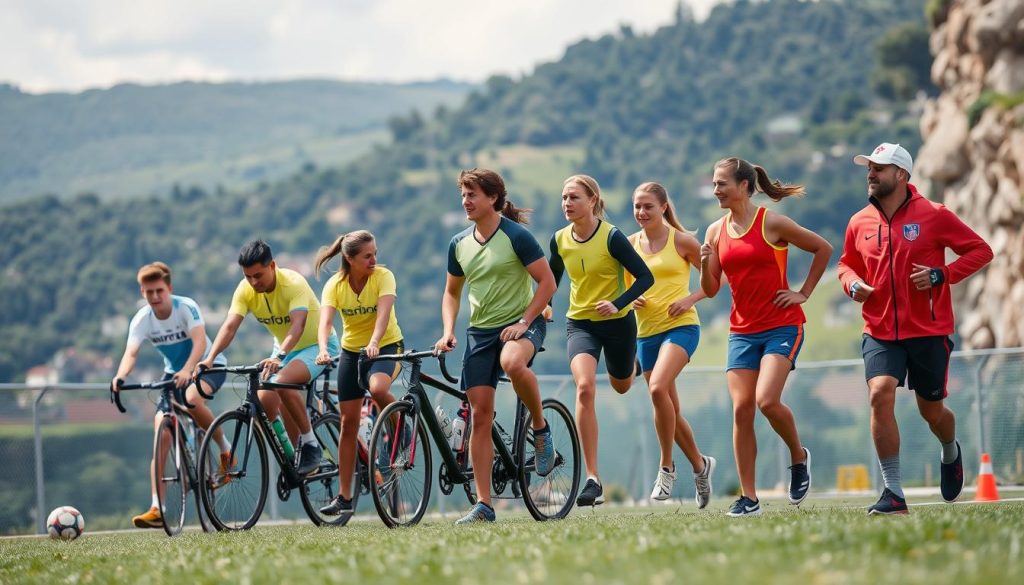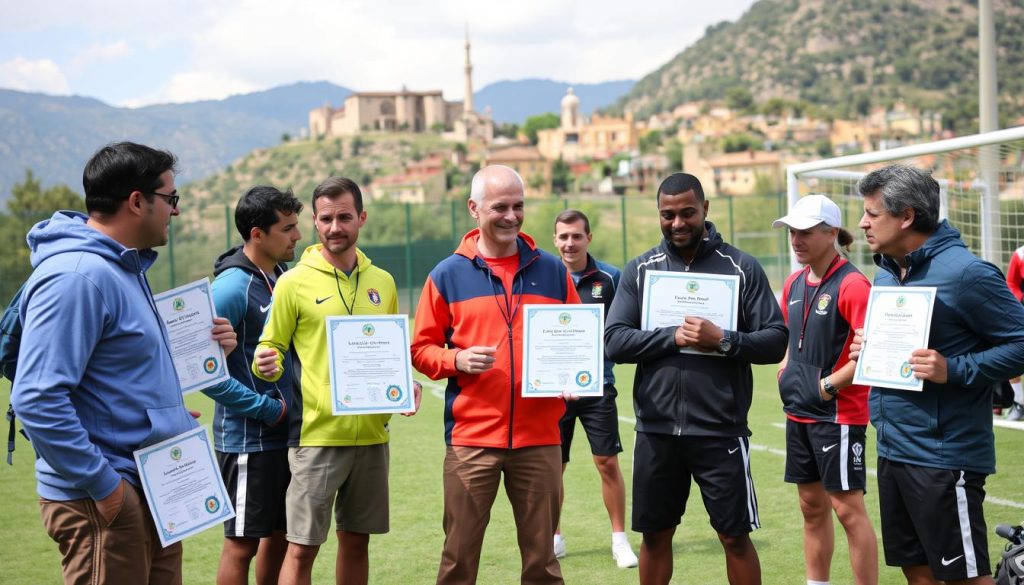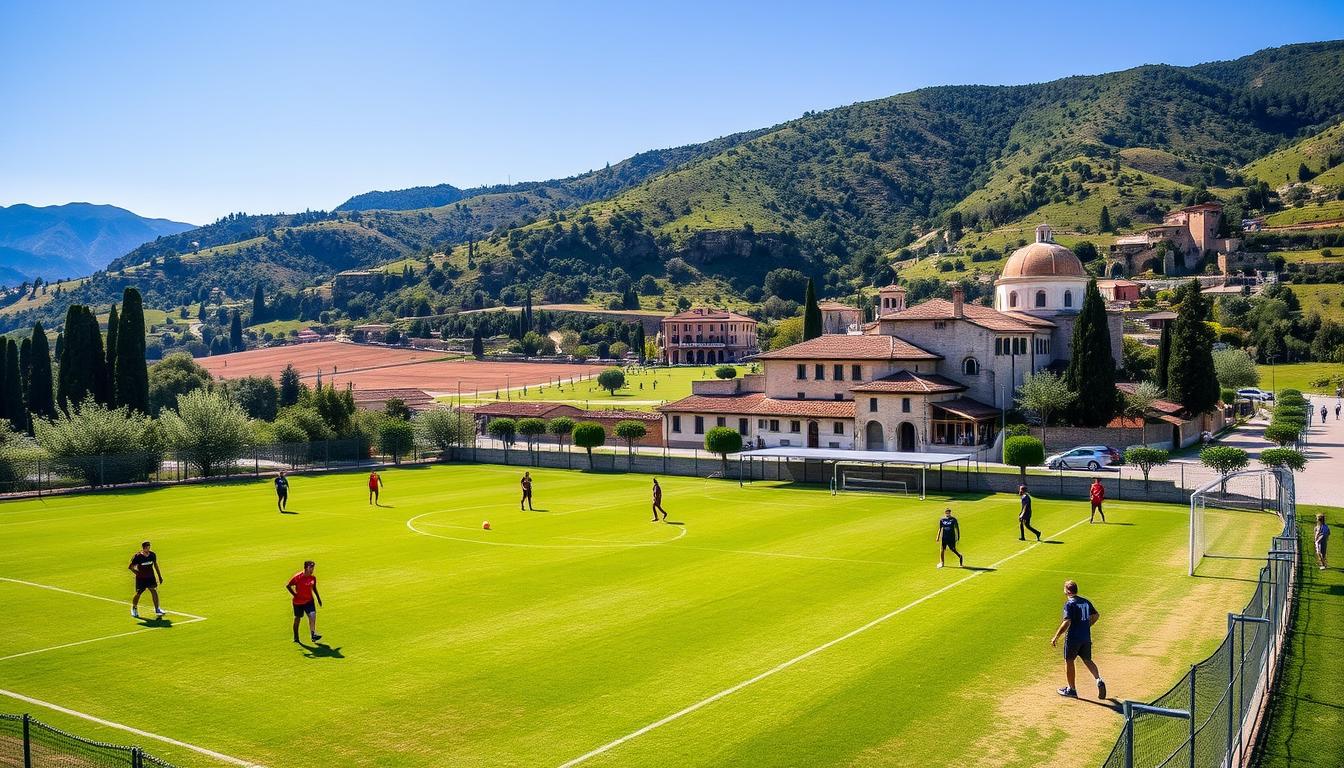Michael Jordan once said, “Some people want it to happen, some wish it would happen, others make it happen.” This quote captures the essence of starting a sports coaching business in Italy. Italy is known for its rich sports history. The country’s sports industry is booming, with more sports facilities and academies opening up.
About 60% of sports coaching businesses in Italy focus on sports like football, basketball, tennis, and swimming. Yet, around 70% face tough competition. This shows the importance of standing out with a unique offer. Starting a sports facility can cost between €50,000 to €150,000, so we need to plan carefully.
We will look at key steps to start a sports coaching business in Italy. This includes understanding the market, finding our niche, and creating effective marketing plans. With our knowledge and passion, we can make a difference in Italy’s sports coaching world.
Understanding the Sports Industry in Italy
The sports scene in Italy is lively and varied, with football, basketball, and cycling leading the way. These sports help build a strong culture that supports athletes at all levels. There’s a growing need for skilled coaches, thanks to more investment in youth sports.
The global sports coaching market was worth billions in 2022 and is set to grow even more by 2028. In Italy, we see a rise in both professional and amateur coaching. This growth covers a wide range of sports, showing the industry’s diverse nature.
Technological progress, changing consumer tastes, and a more competitive market are driving this expansion. Coaching in Italy focuses on personal growth and self-discovery. This approach aligns with the current trend of focusing on long-term development.
Professional coaching in Italy values teamwork, performance, and constant improvement. The use of agile coaching methods boosts team spirit and ensures ongoing value. Understanding these aspects helps us build a successful coaching business in Italy.

Identifying Your Coaching Niche
In the world of sports coaching, finding your niche is key to success. You could focus on youth training, specialise in sports like football or tennis, or even start a sports academy. By matching your skills and interests with what the market needs, you can stand out and attract clients.
The need for sports coaching is huge, especially in areas like athlete development and mental training. With health and fitness coaching on the rise, focusing on improving sports performance can draw a wide range of clients.
Staying innovative in your niche is crucial. As the coaching world changes, you can add new services to meet client needs and stay ahead. Sub-niches like leadership and anxiety coaching show how you can offer more than just traditional coaching.
By clearly defining your niche, you can reach more people and keep clients coming back. They’ll be looking for expert advice tailored to their needs in sports coaching.

Key Reasons to Start a Sports Coaching Business
Starting a sports coaching business is a great idea. It turns our love for sports into a rewarding job. It helps people and the community too. Italy’s love for sports and fitness makes it a perfect place for our work.
Every coaching session boosts athletes’ skills and brings people together. It also helps everyone stay healthy.

Seeing athletes grow is a big reward. It’s good for them and for us. Being empathetic and clear helps us motivate and inspire.
This makes our goal of creating a supportive environment easier to reach.
- Our coaching helps athletes understand the ‘why’ behind their training.
- It supports them in reaching their training goals, leading to better performance.
- We can build lasting relationships with clients, strengthening community bonds.
- Starting our own business gives us more freedom and control over our work.
Success in small businesses is key. Around 20% fail in the first year. But with hard work and planning, we can make it.
Our 25 years in the industry show the power of dedication. Becoming a Regional Business Partner with SportyMinis shows the financial and operational opportunities we can seize.
This journey lets us use our knowledge to help athletes. It’s a chance to grow and succeed in a field that values progress and innovation. Working with athletes and helping them understand training is not just about skills. It’s about creating a space for success.
So, starting a sports coaching business is a fulfilling and rewarding choice.
Setting Clear Goals and Objectives
Setting clear, measurable goals is key in sports coaching. These goals include financial targets, client acquisition, and programme development. By knowing our “why,” like Ian McClurg, we stay focused. This helps us navigate challenges.
We use the SMART framework in our planning. It stands for Specific, Measurable, Achievable, Relevant, and Time-bound. For example, aiming for 80% free throw accuracy in athletes aged 13 to 19 shows the value of clear targets.

Breaking big goals into smaller tasks makes coaching more effective. Say, aiming to make 15 free throws at each practice. Regular checks help us adjust goals, keeping them challenging yet reachable. This motivates our athletes.
AI can help us stay committed to our goals. It acts as an accountability coach, helping us refine our objectives. Using tools like Objectives and Key Results (OKRs) keeps us dedicated and aligned with our vision.
Celebrating small wins boosts motivation in our coaching environment. A culture that values goal achievement keeps us focused. Tailoring motivational strategies helps each athlete find their own path to success.
Market Research for Your Sports Coaching Business
Doing thorough market research is key for a successful sports coaching business. It helps us find our customers and understand who we’re up against. By looking at what others do, we can spot where we can be different and better.
Identifying Potential Customers
First, we need to figure out who we’re aiming for. This means thinking about:
- Age group – making our services fit for different ages can help.
- Fitness level – offering coaching for both newbies and pros is smart.
- Location – knowing where people want our services helps us reach them.
Using surveys and chats with people can give us the lowdown. This helps us tailor our coaching to what clients really want.
Analysing Competition in the Sector
Looking closely at what others do is crucial. We should check:
- What competitors offer – spotting what we can do better.
- How they price things – finding a price that works for our customers.
- How they market themselves – finding new ways to grab attention.

Understanding Market Trends
Keeping up with trends is essential. There’s a big push for custom coaching and online classes. This shows people want more personal and flexible training.
Also, new tech like wearable devices is changing how we train. By using these ideas, we can make our coaching better and grow our business.
Building a Business Plan
A strong sports coaching business plan is our guide. It helps us navigate the journey of starting our business. By setting clear goals, we keep our focus sharp. Ian McClurg says a written vision keeps us on track.
Our plan should include key points:
- Market Analysis: Knowing the coaching industry is crucial. It’s worth about $6.25 billion and growing fast. We can find areas where our coaching meets demand.
- Financial Projections: We need to predict our income and costs. This includes things like internet and software. Our business could be very profitable.
- Marketing Strategies: A good marketing plan is vital. It helps us find clients. Online marketing can help us grow and earn more.
- Anticipated Challenges: We should think about possible problems. Like competition and finding clients. Knowing these helps us find solutions.
With these parts in our plan, we lay a strong base for our business. This forward-thinking can help our coaching business thrive and meet market needs.

Legal Considerations in Italy
It’s key to know the legal rules for starting a coaching business in Italy. We need to follow many laws, from getting registered to dealing with taxes. These rules help us run our business right.
The Italian sports world is run by the National Olympic Committee (CONI). It oversees 45 sports federations and 95,000 clubs. Each has its own rules. Following these rules makes our business look good.
Protecting athletes, especially young ones, is also crucial. We must take steps to keep them safe. This shows we care about their health and well-being.
Keeping up with sports laws is important too. This includes labour laws and rules for big sports events. Knowing about these helps us plan our business better.
Staying updated on laws is essential for our business. Doing research and getting legal advice helps us face any challenges. This shows we’re serious about our athletes’ rights and following the law.

Choosing the Right Location for Your Coaching Business
Finding the perfect spot for your coaching business is key. It affects how easy it is for clients to find you. Being close to schools, sports areas, and homes helps bring in more clients. It’s also important to find a place with the right facilities for your coaching style.
When picking a location, think about these things:
- Accessibility: Make sure clients can easily get to you. Good public transport and parking are a must.
- Demographics: Know who lives nearby. This helps you offer services that meet their needs.
- Competition: Look at other coaching businesses around. This helps you understand the market.
- Facilities: Choose a spot with enough space and the right equipment for your coaching.
Also, consider the community vibe. Being in a supportive area can boost your reputation. It can also lead to more clients through happy referrals. The right location can help your business grow by making it more visible and accessible.

Marketing Strategies for Your Sports Coaching Business
A strong marketing plan is key for our sports coaching business. It helps us draw in new clients and build a solid online presence. This boosts our service awareness and makes us seen as experts in coaching.
Leveraging Social Media
Social media is vital for reaching our audience. We share testimonials, videos, and coaching tips to show our skills. Working with local influencers can also boost our reputation, with 60% of businesses seeing benefits.
Using Instagram, Twitter, and Facebook helps us connect with people. It builds a community around our coaching services.
Building a Website and Online Presence
A professional website is essential for our online image. A site that works well on mobiles can lead to more bookings, as 85% of successful programmes show. Our site should have interesting content about our services and successes.
Adding email marketing can really help our sales, with 70% of businesses seeing a positive effect. Keeping an eye on our marketing results helps us improve and stay up-to-date with trends.

Funding Your Sports Coaching Business
Getting the right funding is key to making our coaching dreams come true. We can look at personal savings, bank loans, and crowdfunding. Knowing our financial options helps us make smart choices. Starting a business costs a lot, including money for equipment, marketing, and renting places.
Good financial planning is the first step to success. We need to think about every expense when making our budget. Important costs include:
- Leasehold improvements (75% of startup costs)
- Equipment (5% of startup costs)
- Legal and accounting fees (1% of startup costs)
- Working capital (3.5% of startup costs)
- Additional funds for three months (9% of startup costs)
Knowing these costs helps us avoid risks and grow. Regular budget checks can cut down on spending. Finding local business partners can also lower our costs, making our money go further.

Trying different pricing levels can boost our income. Using technology makes our business run smoother and cheaper. Working with other sports experts can also help us find the best funding for our business.
Developing Your Coaching Programme
In the world of coaching, creating a good curriculum is key. We make our programmes fit for all skill levels and ages. This makes our programmes popular in the market. We use smart strategies to make sure our programmes meet what clients want.
Getting feedback from our first sessions is very important. It helps us make our programmes better. We keep improving and innovating to keep our clients happy and loyal. This way, we build a community that grows together.

- Realising the need for inclusive physical education programmes, such as those initiated by Badu Sports, challenges children’s physical abilities.
- Involving local expertise strengthens networks and community bonds, as exemplified by Badu Sports drawing its team from surrounding areas.
- Engaging in sports not only improves mental and physical well-being but also contributes to healthier communities.
- Initiatives like the Alliance of Sport – Criminal Justice highlight the transformative power of sport in reshaping behaviours among young offenders.
- Partnerships with schools, local governments, and nonprofits play a significant role in funding youth programmes, particularly in underprivileged regions.
- Companies such as Coaches Across Continents demonstrate the global impact of sports coaching, employing 9,000 coaches to reach 2.7 million children across 132 countries.
- By hiring coaches and other staff, we create economic opportunities and stimulate local economies through our sports-related events.
- It is notable that many individuals involved in coaching do not necessarily follow traditional pathways such as the COACH-TED programme for advanced training.
- Completion rates for all assessment tasks and licensure requirements remain low, indicating a need for increased commitment to ongoing learning.
- Continuous improvement in coaching practices is essential, particularly as many coaches rarely advance from “Level 1 to Level 2” accreditation.
Our dedication to improving our coaching programmes is what will make us successful. It’s all about building a strong and effective coaching community.
Networking within the Sports Community
Getting involved in sports community networking is key to making a name for ourselves. Building connections with others in the field can open doors to new collaborations and referrals. This can greatly benefit our coaching business.

Using online platforms like LinkedIn helps us connect with many sports professionals. A strong online presence boosts our visibility and trustworthiness. It’s also vital to meet people face-to-face at events and conferences, like the National Sports Forum. These meetings are great for building professional relationships.
- Attending networking mixers can help us make lasting connections.
- Joining sports-focused organisations and clubs gives us access to unique resources and growth opportunities.
- Following industry leaders on social media, like X (formerly Twitter), keeps us up-to-date with the latest trends.
Being true to ourselves is crucial in networking. Building real relationships can lead to opportunities that help us grow in our careers. Getting advice from experienced professionals not only guides us but also opens doors for future jobs.
Also, platforms like Sports Connect are a big help for coaches. They offer mentorship and networking events. Their training and workshops help us improve, showing how important it is to keep learning in the competitive world of sports coaching.
Hiring Qualified Coaching Staff
Choosing the right coaching staff is key to our business’s success. We look for candidates with the right qualifications to serve our clients well. A good coach should have a recognised coaching certificate and a First Aid certificate. They also need a DBS check, especially when working with kids.

What to Look for in a Coach
When hiring, we focus on more than just qualifications. We seek coaches who love their sport and enjoy teaching kids. They should have:
- Strong communication skills
- Enthusiasm and a positive attitude
- Leadership qualities
- A focus on safety
- A real passion for sports and youth development
Coaches work in many sports, like football, basketball, and gymnastics. They need to be flexible and tailor their coaching to meet our standards. Working in Italy’s sports coaching scene can be rewarding but also demanding, with long hours and travel.
Practical experience is crucial in finding the right coach. Many start as volunteers or part-timers, gaining experience and building on their qualifications. This approach helps them improve their skills and build strong bonds with their students and the community.
Enhancing Your Skills and Knowledge
Continuous learning is key in the sports coaching world. We need to look for workshops, seminars, and courses to stay updated. Working with experienced mentors can give us new insights, helping us improve our coaching.
Investing in our growth boosts our skills and how we connect with clients. Not doing so might make it hard to attract new clients or keep the ones we have. Coaches who focus on improving their skills tend to have a more rewarding career.
Being able to listen well and stay calm is crucial in coaching. It helps create a space where clients feel free to share. By being non-judgmental, we help clients find their own solutions and reach their full potential.
It’s important to see each client’s unique strengths and help them grow. We should aim to build confidence in our coaching, which builds trust with our clients. Working together in sports coaching education leads to better results, especially when our goals match the organisation’s needs.
In short, a focused approach to professional development can greatly improve our coaching. By always learning and improving, we become leaders in the sports coaching field.

Utilising Technology in Coaching
Using technology in sports coaching makes our work better. We can track athletes’ performance with wearable tech. This includes heart rate, speed, and movement patterns. Advanced software gives us key insights for making informed decisions about our sports programs.
Virtual coaching brings new chances. It lets us reach more people and offer training that fits each athlete’s needs. Real-time feedback boosts learning, and virtual reality (VR) helps athletes practice game scenarios. This improves their decision-making skills.
With data analytics, we make better decisions. It helps us manage health, check coaching performance, and keep track of inventory. Strong reporting and alerts help our sports programs grow.
AI and machine learning give us deep insights from data. We can tailor feedback and training plans to meet goals. This helps us build a culture that values data and keeps everyone involved.
Communication tools make our work easier. They help us talk better within coaching teams. Video calls make team meetings and training possible, no matter where we are.
Management software also improves our work. It helps with scheduling, payments, and more. This makes life easier for parents and helps us keep good relationships with everyone involved.

Measuring Success and Adaptation
In our journey of building a sports coaching business, measuring coaching success is key. We regularly check how well our clients are doing. This helps us see how many clients we keep and how happy they are.
By looking at player performance data, we make better coaching choices. This approach helps players perform at their best. It also keeps our standards high while being inclusive.
It’s also important to listen to feedback to adapt our business. Looking at what we’ve done well and what we haven’t helps us get better. We try different coaching styles to meet each team member’s needs.
This way, we build a strong team. Everyone works together towards the same goals. This unity helps us move forward as a team.
At the heart of a successful sports coaching programme is engaging athletes. It’s not just about following rules. It’s about understanding what drives athletes to do their best.
As we improve and adapt, our methods stay effective. This helps our coaching business grow and succeed.








